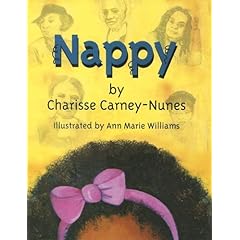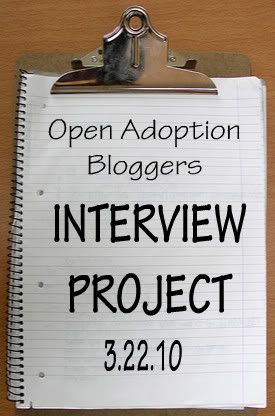
Someone gave Firefly a copy of the picture book
Nappy by Charisse Carney-Nunes for Christmas. It's a bit beyond her reading (listening?) level right now, but Puppy asks for it on occasion.
The other day he looked up from the couch, where he sat with the book on his lap. "Firefly's hair is nappy!" he said happily, pleased with himself for making the connection.
I admit it stopped me in my tracks, hearing "nappy" coming from my white son's lips. Even though I knew full well it was being used innocently, even positively, in this specific instance, my gut reaction was negative. I had a flash of him--the only white child in the church--blithely labeling his African-American peers "nappy" the next morning at Sunday School.
I realized I was caught between parenting goals: wanting to affirm his connection of his sister's tight coils to those of the black historical figures celebrated in the book; needing to start teaching him why he and I can't use that word the same way Firefly can. If I have any sort of strategy (to use that word loosely) at this point with tiny Firefly, it is to work on creating a positive association with "nappy," so that when she hears it applied negatively to her hair for the first time--and I believe it is a question of when, not if--she will already have a sense of familiarity with and even ownership of the word. But even there I tread lightly, knowing that there is
no one shared perspective on "nappy" among African-Americans. The one thing I know for certain is that it is not a word I, as a white person,
should throw around casually, if at all. While I had thought some about familiarizing Firefly with "nappy," particularly after we were given the book, I had neglected to think about my approach with Puppy. He was picking up the positive association but without any of the cultural context he also needed. (Perfectly understandable for a four-year old.)
"Firefly's hair
is nappy," I agreed. "It's one of the ways to describe her pretty curls. It's a word we can use here at home with our family. But it's not one that we should use with people who aren't in our family."
"Why?"
"It's a word that some people use to be mean. They call hair 'nappy' as a way of saying someone's hair doesn't look nice. And when someone who isn't in our family hears you using it, they won't be able to tell whether or not you're being mean. You could hurt their feelings."
"People think 'nappy' is mean?"
"Some people do. They are often people who have straight hair and pink skin like you and I do, instead of curly hair and brown skin like Firefly. If we tell a curly-haired person that their hair is nappy, they might think we're trying to be mean at them.* When you're older it will be easier to figure out when you can use the word 'nappy.' But while you're little it's better if it's a family word."
My off-the-cuff response seemed to be enough for him that night. Later that weekend I overheard him making sure Todd knew that "nappy" was a family word, so I know he was thinking about it more. And he hasn't stopped reading the book, so I think so far he hasn't taken it as an over-correction.
It can be a tricky thing, raising my children of different races. Trickier than I think raising two African-American kids would have been, although I'm throwing guesses at the wind there. There are some specific things I need to pass onto each of them; chief among them for Puppy is what it means to be aware of his whiteness (among his other privileges). Teaching Firefly that "nappy" is her word to claim and define while simultaneously teaching Puppy that he can't do the same, at least not in the same way. There is a tension in trying to create a unified "us" as a multiracial family while also acknowledging that our family identity is different than our individual racial identities. Not overemphasizing that three of the four of us share whiteness, but not ignoring it either. Our multiracial-ness as family makes us visible in particular ways and sometimes changes how others interact with us. But parenting a child of color doesn't make
me a person of color; being a brother to a black sister doesn't make Puppy black.** When any of us leaves the house without Firefly, our multiracial family identity becomes invisible to others.
It's not the first of these sorts of moments with Puppy and I know it won't be the last. I'm interested in knowing if others of you with similar family make-ups ever feel that same tension.
* This is a Puppy grammar quirk. You're mean at people, not mean to people. He insists on it. Don't ask me why.
**You might be saying, "Well, duh, Heather." But you see that sometimes here and there, white transracial adoptive parents who announce they're an African-American/Chinese/Ethiopian/etc. family now because of their child's background. I suspect they're trying to describe how their perspective on race and culture has changed, or their efforts to embrace their child's heritage. But I think they take it a bit far. I didn't trade in my whiteness the day Firefly came home.
 And now for the fun! In the spirit of the Great Interview Experiment, I thought we'd celebrate the blogroll's birthday with a virtual mixer: The Interview Project. Everyone who'd like to join in will be paired with a fellow open adoption blogger. You'll have two weeks to get to know their blog and send them some interview questions by email. On March 22, you'll post the interview on your blog and your partner will post their interview of you. It's a double benefit to everyone who participates: you'll get to know a blogger better and introduce them to your readers, and your blog will be introduced to their audience. Hooray for networking and cross-pollination!
And now for the fun! In the spirit of the Great Interview Experiment, I thought we'd celebrate the blogroll's birthday with a virtual mixer: The Interview Project. Everyone who'd like to join in will be paired with a fellow open adoption blogger. You'll have two weeks to get to know their blog and send them some interview questions by email. On March 22, you'll post the interview on your blog and your partner will post their interview of you. It's a double benefit to everyone who participates: you'll get to know a blogger better and introduce them to your readers, and your blog will be introduced to their audience. Hooray for networking and cross-pollination!

